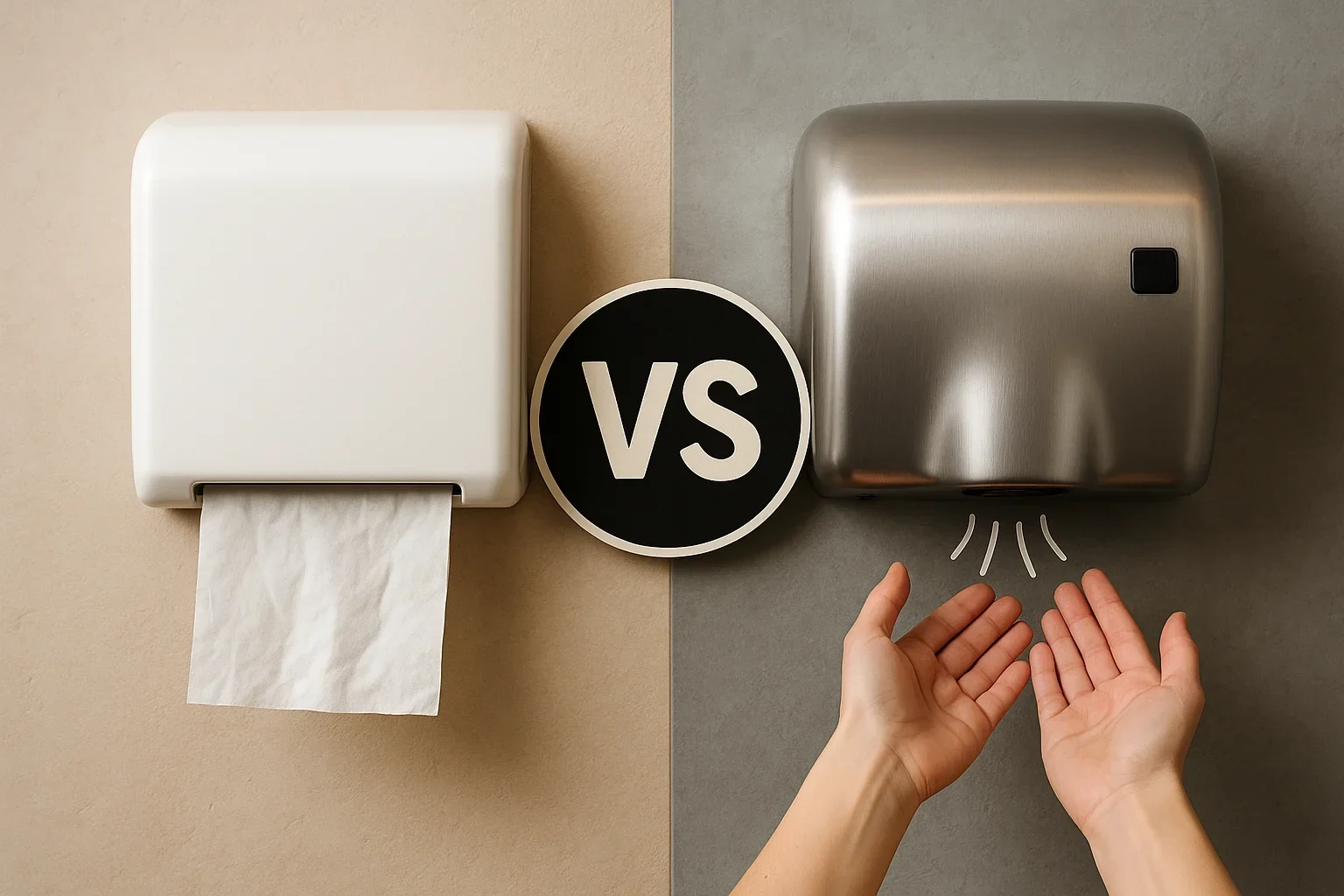Public restrooms in malls, IT parks, hospitals, and other high-traffic areas must prioritize hygiene, efficiency, and cost-effectiveness. One common debate in restroom management is whether to use tissue paper or hand dryers for drying hands. Each option has its own advantages and drawbacks. Let’s break it down to help businesses make the best choice.
1. Hygiene and Health Considerations
Tissue Paper: The Hygienic Choice?
A simple and efficient method for drying hands and getting rid of bacteria is to use tissue paper. Research indicates that using tissue paper to wipe hands can lessen bacteria on the skin more efficiently than letting them air dry. Tissue paper is also disposable, which reduces the possibility of cross-contamination.
Advantage :
Removes bacteria effectively
No risk of airborne germ spread
Reduces cross-contamination
Disadvantage :
Requires frequent restocking
Generates waste that needs proper disposal
Hand Dryers: Are They Hygienic?
While hand dryers eliminate the need for disposable materials, some high-speed air dryers can spread bacteria and viruses through the air. Traditional warm-air dryers take longer to dry hands, leading some users to leave with damp hands, which can spread germs. However, newer HEPA-filtered jet dryers minimize this risk.
Advantages :
No paper waste
Touchless operation reduces direct contact
Modern models with HEPA filters improve hygiene
Disadvantages :
Some models can spread germs through air circulation
Takes longer to dry hands
2. Cost and Maintenance
Tissue Paper: Ongoing Restocking Costs
Using tissue paper means continuous expenses for refilling dispensers and waste management. Businesses must also ensure proper disposal to avoid restroom clutter. However, bulk purchasing can lower cots.
Estimated Cost: Higher long-term costs due to regular purchases.
Hand Dryers: One-Time Investment
Hand dryers require a higher initial investment, but they reduce long-term expenses as they don’t need refilling. However, maintenance costs (like cleaning filters and repairing breakdowns) should be considered.
Estimated Cost: Lower long-term cost but requires power consumption.
3. Environmental Impact
Tissue Paper: Produces waste but can be sourced from recycled materials to reduce environmental impact. Proper disposal and recycling programs can further help sustainability efforts.
Hand Dryers: Reduce paper waste but consume electricity. Energy-efficient models with low power usage can be an eco-friendlier choice.
Best Eco-Friendly Option: If sustainability is a priority, recycled paper towels or energy-efficient hand dryers with HEPA filters are the best choices.
Which One Should Your Business Choose?
✅ For Hospitals & Healthcare Facilities: Tissue Paper is the better choice due to hygiene concerns and the need to minimize airborne germ spread.
✅ For High-Traffic Areas (Malls, Airports, IT Parks): High-speed HEPA-filtered hand dryers reduce waste and lower long-term costs.
✅ For Offices & Corporate Spaces: Either option works, but energy-efficient dryers can reduce maintenance efforts.
✅ For Sustainable Businesses: Consider recycled tissue paper or low-energy hand dryers.
There is no one-size-fits-all answer. Tissue paper is better for hygiene, while hand dryers are cost-effective and eco-friendly in the long run. Businesses should choose based on hygiene priorities, budget, and environmental goals.
For Order Tissue paper products: https://evolvehygiene.com/products/tissue-paper-products/
For Order Hand Dryers : https://evolvehygiene.com/products/dispensers/hand-dryer/


